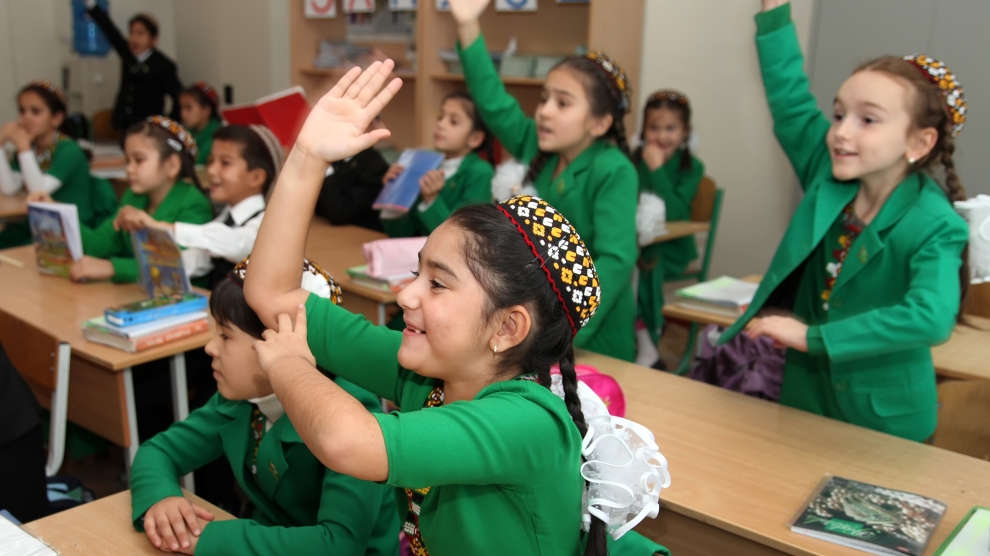The World Bank has warned that the Covid-19 pandemic could have a detrimental and long-lasting impact on education and human capital, economic and social development in Central Asia, where schoolchildren and students make up nearly half of the overall population.
At an online briefing held for regional media, experts, academia, and development community in the region, the bank warned that the crisis threatens to deprive the younger generation of future earnings, as it pushes a large share of Central Asian students into functional illiteracy – the inability to read, write, and do math at a level necessary to be productive.
Before the pandemic, education across Central Asia was already suffering from low learning levels, as countries struggled to eliminate learning poverty, distribute equal opportunities to poor learners, and promote inclusion. Students across the region were a year and a half behind their peers in Europe, with many also performing significantly below functional literacy levels, according to the OECD Programme for International Student Assessment (PISA).
Learning inequality is of particular concern, with the gap between students from various income levels widening due to a number of factors, including differential access to distance learning for teachers and students, teaching support, access to teaching and learning materials at home, and household contribution to home schooling. According to PISA, in Kazakhstan, children from the poorest families were one year behind their peers, while in the Kyrgyz Republic poor students were 2.5 years behind.
The Covid-19 pandemic has further exacerbated the learning deficiencies, with school closures impacting already marginalized groups, including students from socio-economically disadvantaged backgrounds, learners with disabilities and minorities.
“The Covid-19 pandemic is dealing a blow to education and learning so destructive we will feel its negative effects for decades to come, including 44 billion US dollars in economic loss in Central Asia alone, and this is not our most pessimistic scenario,” says Ayesha Vawda, lead education specialist at the World Bank in Central Asia. “Central Asian countries took swift action to deliver emergency learning via multiple channels and modes. Now is the time for governments to respond in a way that lays the foundation of the new education system – one that is high quality, resilient and equitable.”
During the briefing, the World Bank stressed that education needs to be at the forefront of the national recovery plans in Central Asia. The countries need to protect education budgets, improve the quality of distance learning, allow flexibility in the curricula to focus on competencies and skills instead of knowledge, empower teachers with effective remediation strategies and with diagnostic and formative assessments and increased instruction time to allow recovery of learning losses.
As teachers become more aware of the learning, and learning loss of each child, remedial education plans will need to be developed. Special attention will need to be given to those students who have suffered the most during the school closures. The countries also need to develop digital skills amongst students, youth and teachers and increase teacher-student interaction on different distance learning platforms to better respond to the needs of the continuing crises.
“The World Bank in Central Asia and globally has always put special focus on education and building human capital, understanding too well that these investments bring the highest dividends,” says Lilia Burunciuc, World Bank Regional Director for Central Asia. “Currently, we have adapted three education projects in the region to respond to Covid: in Kazakhstan, the Kyrgyz Republic, and Uzbekistan. Through these projects, we were able to mobilise some support for emergency and remote learning. For instance, in Kazakhstan this includes monitoring distance learning and provision of digital equipment for rural teachers”.
Earlier this week, the Asian Development Bank warned that two Central Asian countries, Kyrgyzstan and Tajikistan, along with Georgia, would be particularly hard hit by a drop in remittances from seasonal and long-term migrants in Russia and Europe.
“The worst-case scenario assumes that the domestic outbreak control and resumption of economic activities take a year’s time,” the bank said in a statement. “Uncertainty looms about the timing of full recovery, even as lockdowns are lifted.”
Money sent to Asia, where about a third of migrant workers worldwide come from, could fall by 54.3 billion US dollars, or about a fifth of baseline remittances, the Manila-based lender said.
—
Unlike many news and information platforms, Emerging Europe is free to read, and always will be. There is no paywall here. We are independent, not affiliated with nor representing any political party or business organisation. We want the very best for emerging Europe, nothing more, nothing less. Your support will help us continue to spread the word about this amazing region.
You can contribute here. Thank you.


